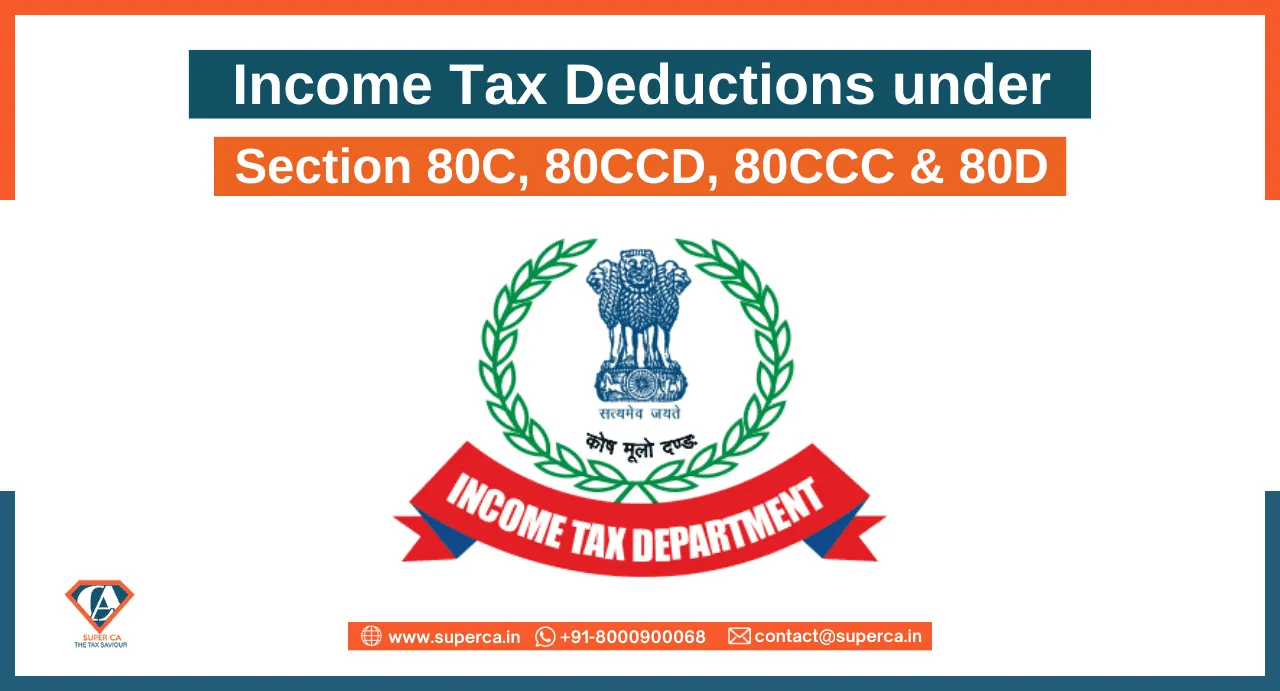Income Tax Deductions under Section 80C, 80CCC, 80CCD & 80D
- Posted By SuperCA
- On 05 July

Tax deductions can help a person in reducing the taxable income, lowering their overall tax liability and thereby helping them save on taxes.Many people look for saving income tax by investing in tax saving options. The amount of tax that can be saved depends on the type of tax benefit claimed.
There are certain deductions available under section 80C, 80CCD, 80CCC & 80D of Income Tax Act with different conditions attached to them. These deductions are a relief offered by the authorities that help individuals lower their taxable income and ultimately reduce their tax outgo in any given financial year and at the same time they aim for encouraging savings and investments amongst the taxpayer and assist them in constructing a stable monetary future. The eligibility for deductions depends on a number of factors, with different limits set for different purposes. Come, let's take a look at the various investments and forms of expenditure which will lead you to avail deductions on your taxable income.
Deduction under 80 C (Deduction on Investments)
Section 80C of the Income Tax Act which came into effect back on 1 April 2006 provides provisions for tax deductions on a number of payments, with both individuals and HUF eligible for these deductions. This covers the most popular income tax deduction ways. The maximum exemption limit in the section is ₹1.5 Lakh per year under Section 80C, with this amount being a combination of deductions available under sub sections 80 C, 80 CCC and 80 CCD.
The most common deductions that can be claimed under section 80C are for:
➤ Premiums paid for life insurance policy
➤ Investments in PPF, EPF and VPF
➤ Repayment of principal amount of housing loan
➤ Investment in equity-linked savings scheme (ELSS) of mutual funds
➤ Investments in certain post-office schemes like Sukanya Samriddhi Yojana (SSY), National Savings Certificates (NSC), Senior Citizens' Savings Schemes (SCSS)
| Investment | Minimum Duration | Rate of Interest | Risks | Return Filing Requirement |
|---|---|---|---|---|
| National Pension System | Till the individual reaches the age of 60 years | 8% - 10% | High | No |
| Equity Linked Saving Scheme | 3 years | 12% -15% depending on the fluctuations in the market | High | No |
| Public Provident Fund | 15 years | 7.1% | Low | Yes |
| Senior Citizen Savings Scheme | 5 years | 7.40% | Low | Yes |
| National Savings Certificate | 5 years | 6.8% | Low | Yes |
| Unit Linked Insurance Plan | 5 years | 8%- 10% depending on the fluctuations in the market | Moderate | No |
| Fixed Deposit | 5 years | Up to 8.40% | Low | Yes |
| Sukanya Samriddhi Yojana | 21 years | 7.6% | Low | Yes |
Section 80C has a comprehensive list of deductions an individual is eligible for, which has led to the creation of suitable sub-sections to provide clarity to taxpayers.
➤ Section 80CCC - (Deduction for Premium Paid for Annuity Plan of LIC or Other Insurer)
This section provides scope for tax deductions on investment in pension funds. These pension funds could be from any insurer and a maximum deduction of Rs 1.5 lakh can be claimed under it. This deduction can be claimed only by individual taxpayers.
➤ Section 80CCD (Deduction for Contribution to Pension Account)
Section 80CCD (1) - Employee Contribution
Deduction in relation to contribution to the Central Government pension scheme. In the case of an employee, 10% of salary (basic + DA) and in another situation 20% of gross income in a financial year will be tax free. The total limit is Rs 1.5 lakh with section 80C and 80CCC.
Section 80CCD (1B) - Self Contribution
Section 80 CCD (1B) allows a further deduction of INR 50,000, over and above the deduction available under Section 80C for INR 1.5 lakhs. Deductions under this are allowed if you invest towards the National Pension Scheme (NPS) offered by the Government of India. Contributions to Atal Pension Yojana are also eligible for deduction.
Section 80CCD (2) - Employment Contribution
Deduction in respect of contribution by the employer to the Central Government pension scheme. Tax benefit is given by the employer on 14 per cent contribution, where such contribution is made by the government. A tax benefit of 10% is given by another employer.
Section 80D (Deduction on premium paid for medical insurance)
Deductions under Section 80D are available for individuals and Hindu Undivided Families (HUFs). A person can claim a deduction for the health insurance premium and expense incurred towards preventive health checkup for self, spouse, dependent children and parents. However, this is subject to the terms and conditions mentioned in the Section 80D of the Income Tax Act, 1961.
| Insured Person | Deduction Amount | |
|---|---|---|
| Below 60 yrs. | Above 60 yrs. | |
| Self, Spouse and Children | 25,000/- | 50,000/- |
| Taxpayer’s Parents | 25,000/- | 50,000/- |
| Maximum Deduction Limit | 50,000/- | 1,00,000/- |
| Preventive Healthcare Expenses* | 5,000/- | 5,000/- |
*Preventive Healthcare Expenses: If your total insurance premium paid is less than the maximum allowed limits for any of the categories, then up to `5000 can be claimed for a preventive health check of your family in the financial year, within the said limits.
If you have taken out a health insurance policy for yourself, your husband or wife and dependent children, you can claim deductions of Rs. 25,000. An additional deduction upto Rs. 25,000 is available for parents under 60 years of age. The deduction limit was raised to Rs. 50,000 from the earlier Rs. 30,000 for parents above 60 years of age. The deduction limit is Rs.1 Lakh when combining both taxpayer and parents aged above 60.
Conclusion
Many people start making investments for tax deductions towards the end of a financial year. This approach is totally wrong as tax experts suggest that investments are best when made at the start of a financial year as doing so would not only mean that you are making informed decisions, but also ensuring that you earn the interest for the whole year.
The tax saving investments options would be dictated by a multitude of factors like your age, risk appetite and the amount that you wish to invest. However, some basic ones that you should consider investing in are life insurance, health insurance policies, mutual funds, FDs and PFs. But you should keep in mind that filing Income Tax is compulsory and you cannot completely avoid paying tax. However with proper planning, you can reduce your taxable income to an extent.





